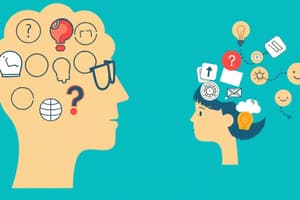Podcast
Questions and Answers
What does sustained attention primarily refer to?
What does sustained attention primarily refer to?
- The ability to switch focus quickly between tasks.
- The ability to remember multiple stimuli at once.
- The ability to ignore distractions for short periods.
- The ability to maintain prolonged concentration on a specific task. (correct)
Which of the following best describes selective attention?
Which of the following best describes selective attention?
- Shifting focus rapidly among multiple stimuli.
- Taking in every detail of the environment.
- Maintaining attention on a task until completion.
- Focusing on a single sound while ignoring others. (correct)
Which factor does NOT influence sustained attention?
Which factor does NOT influence sustained attention?
- Multitasking (correct)
- Environment
- Fatigue
- Motivation
What is meant by executive attention?
What is meant by executive attention?
Which activity would likely require strong sustained attention?
Which activity would likely require strong sustained attention?
How does selective attention filter stimuli?
How does selective attention filter stimuli?
Which type of attention is primarily about managing distractions?
Which type of attention is primarily about managing distractions?
What might NOT improve an individual's sustained attention?
What might NOT improve an individual's sustained attention?
What role does selective attention play in a noisy meeting?
What role does selective attention play in a noisy meeting?
How does divided attention affect task performance?
How does divided attention affect task performance?
Which aspect of attention is primarily engaged when planning to solve a complex problem?
Which aspect of attention is primarily engaged when planning to solve a complex problem?
What is the primary characteristic of concentration in a work setting?
What is the primary characteristic of concentration in a work setting?
Which physical factor does NOT influence attention?
Which physical factor does NOT influence attention?
Why do motives affect attention according to the discussed principles?
Why do motives affect attention according to the discussed principles?
What does executive attention primarily focus on during problem-solving?
What does executive attention primarily focus on during problem-solving?
What aspect distinguishes concentration from selective attention?
What aspect distinguishes concentration from selective attention?
What is selective attention primarily focused on?
What is selective attention primarily focused on?
What does divided attention refer to?
What does divided attention refer to?
Which type of attention involves shifting gaze to indicate focus?
Which type of attention involves shifting gaze to indicate focus?
What is a key function of executive attention?
What is a key function of executive attention?
What primarily influences an individual's ability to concentrate?
What primarily influences an individual's ability to concentrate?
In which scenario is sustained attention particularly important?
In which scenario is sustained attention particularly important?
How can one improve both attention and concentration?
How can one improve both attention and concentration?
What is the relationship between attention and concentration as described in the content?
What is the relationship between attention and concentration as described in the content?
What does covert attention allow a person to do?
What does covert attention allow a person to do?
Which example describes concentration rather than attention?
Which example describes concentration rather than attention?
Flashcards are hidden until you start studying
Study Notes
Attention and Its Types
- Attention is the cognitive ability to focus on a specific stimulus amid numerous competing stimuli.
- Essential for filtering out excess information in environments like busy city streets or crowded settings.
Types of Attention
-
Sustained Attention
- Ability to maintain prolonged concentration on a task without distractions.
- Vital for activities like reading and complex problem-solving.
- Influenced by factors such as fatigue, motivation, and environment.
-
Selective Attention
- Involves filtering to focus on specific items while ignoring others.
- Requires tuning out both external stimuli and internal distractions like thoughts and emotions.
- Illustrates the concept that attention is selective and involves exclusion to manage multiple possible inputs effectively.
-
Divided Attention
- Involves multitasking, attending to multiple stimuli simultaneously.
- Can be overt (shifting focus with eye movement) or covert (not moving eyes while shifting attention).
- A combination of overt and covert attention occurs when maintaining focus on one object while being aware of others nearby.
-
Executive Attention
- Involves management of higher cognitive processes such as planning, decision-making, and problem-solving.
- Critical for regulating behavior according to set objectives and goals.
Concentration
- Concentration refers to maintaining high attention on a specific task for an extended duration.
- Linked closely to attention; good attention enhances deep concentration.
- Factors affecting concentration include the environment, motivation, and fatigue.
Strategies for Improving Attention and Concentration
- Practices such as meditation, time management, and mindful pausing can enhance both attention and concentration.
Examples Illustrating Differences Between Attention Types
-
Reading a Book
- Sustained Attention allows engagement with the story, while Concentration leads to deep immersion and time loss.
-
Meeting
- Selective Attention enables focus on the presenter amidst noise; Concentration helps actively participate in discussions.
-
Multitasking
- Divided Attention occurs when juggling tasks like emails and meetings, potentially compromising quality; Concentration focuses solely on one task for optimal results.
-
Problem Solving
- Executive Attention organizes strategies for problem-solving; Concentration is necessary for deep involvement in tackling challenges.
Determinants of Attention
-
Physical Factors
- Characteristics like brightness, size, and contrast can capture our attention, e.g., brightly packaged products.
-
Motives
- Individual motives influence what captures attention, such as food-related stimuli becoming more prominent when hungry.
Understanding Selective Attention
- Early studies confirmed selective attention's role in processing incoming information, leading to focused perception of stimuli deemed significant.
Studying That Suits You
Use AI to generate personalized quizzes and flashcards to suit your learning preferences.



